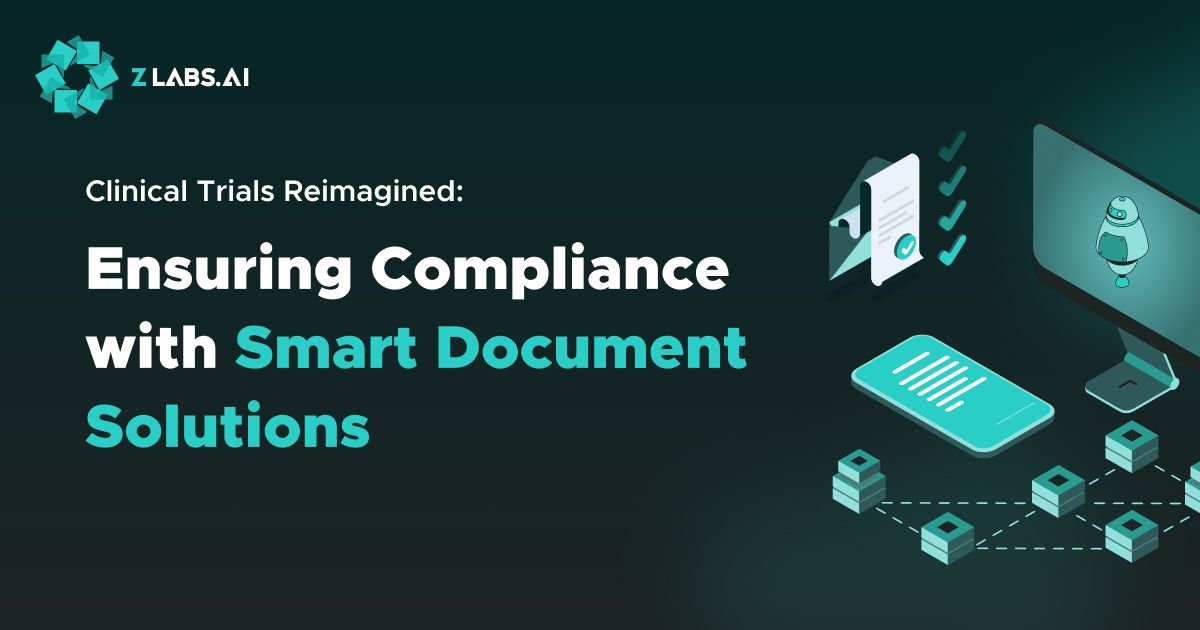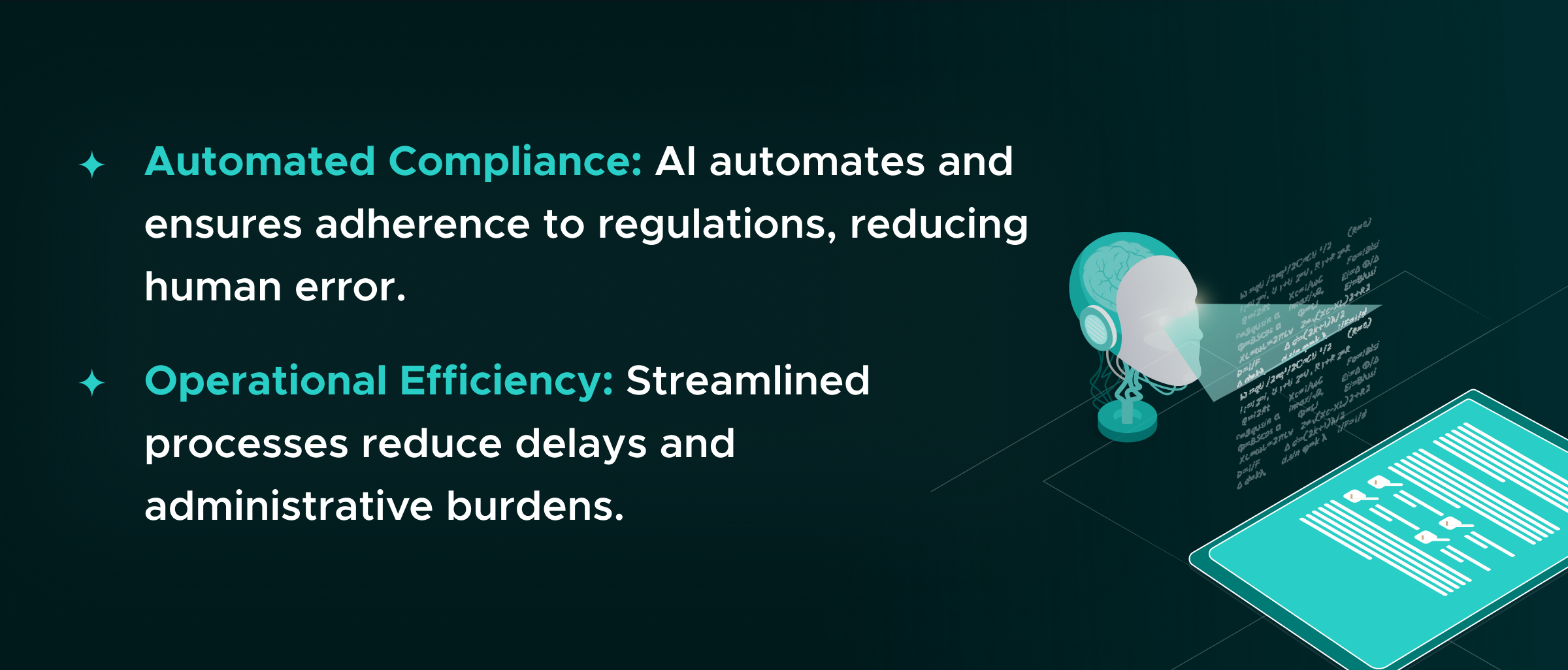Smart Document Solutions for Clinical Trial Compliance | ZLabs
In the complex and highly regulated world of clinical trials, ensuring compliance with stringent regulations is paramount. The sheer volume of documentation involved can be overwhelming, and managing these documents efficiently is crucial for the success of any trial. Smart document solutions, powered by advanced technologies like artificial intelligence (AI) and machine learning (ML), are revolutionizing the way clinical trials are conducted. This blog explores how these intelligent solutions can ensure compliance and streamline the management of clinical trial documents, with insights from leading sources like HBR, WEF, McKinsey, Forbes, and Deloitte.

The Compliance Challenge in Clinical Trials
Clinical trials involve a vast array of documents, including study protocols, patient consent forms, case report forms, and regulatory submissions. Managing these documents manually is not only time-consuming but also prone to errors and compliance risks. According to McKinsey, pharmaceutical companies spend an average of 15-30% of their R&D budgets on activities related to clinical trial documentation and compliance. This highlights the need for more efficient and reliable document management solutions.

Smart Document Solutions: A Game Changer
Smart document solutions leverage AI and ML to automate and streamline the management of clinical trial documents. These technologies offer several key benefits that can transform the compliance landscape in clinical trials:
Automated Data Extraction and Processing
AI-driven document solutions can automatically extract and process data from various clinical trial documents, reducing the need for manual data entry. Forbes reports that these systems can reduce document processing times by up to 70%, significantly improving efficiency and accuracy.
Enhanced Compliance and Audit Readiness
Smart document solutions can ensure that all documents are compliant with regulatory requirements by automatically checking for completeness, accuracy, and consistency. Deloitte highlights that these systems can also maintain a comprehensive audit trail, making it easier to demonstrate compliance during regulatory inspections.
Improved Data Integration and Accessibility
By digitizing and centralizing clinical trial documents, smart document solutions make it easier for researchers and regulatory bodies to access and share information. The World Economic Forum (WEF) notes that this improved accessibility can enhance collaboration and transparency, leading to better trial outcomes.
Advanced Analytics and Insights
AI-powered document solutions can analyze large volumes of clinical trial data to uncover patterns and insights that might not be immediately apparent. This capability is particularly valuable for identifying potential compliance issues and optimizing trial protocols. According to HBR, predictive analytics can help forecast and mitigate risks, ensuring smoother trial operations.

Real-World Applications and Success Stories
Several organizations have successfully implemented smart document solutions to enhance compliance and efficiency in clinical trials:
Pfizer: Streamlined Regulatory Submissions
Pfizer has adopted AI-driven document management systems to streamline its regulatory submissions. McKinsey reports that this has led to a 50% reduction in submission preparation time, ensuring faster approvals and bringing new treatments to market more quickly.
Johnson & Johnson: Enhanced Data Management
Johnson & Johnson uses smart document solutions to manage its clinical trial data more effectively. Forbes highlights that this has improved data accuracy and compliance, reducing the risk of regulatory issues and enhancing trial integrity.
Novartis: Optimized Trial Protocols
Novartis employs AI-powered document solutions to optimize its trial protocols. Deloitte notes that this has led to better trial design and execution, improving patient outcomes and accelerating the development of new therapies.
The Future of Compliance in Clinical Trials
As AI and ML technologies continue to advance, the capabilities of smart document solutions will expand, offering even greater benefits for clinical trials. Here are some future developments to watch:
Enhanced Security and Data Privacy
With growing concerns about data privacy and security, future smart document solutions will incorporate advanced security features to ensure compliance with regulations like GDPR and HIPAA. The World Economic Forum emphasizes the importance of secure AI systems in maintaining trust and protecting sensitive clinical trial data.
Integration with Blockchain Technology
Integrating smart document solutions with blockchain technology can provide an additional layer of transparency and security. Blockchain's immutable ledger can ensure the integrity of clinical trial data, reducing the risk of fraud and enhancing trust among stakeholders.
Predictive Compliance Monitoring
Future AI systems will be able to predict compliance issues before they arise, allowing proactive measures to be taken. This predictive capability will be invaluable for maintaining compliance throughout the trial lifecycle and ensuring the success of clinical trials.
Conclusion
In today's data-driven world, efficiently managing and analyzing vast amounts of structured and unstructured data is crucial for business success. AI-driven document analysis systems, such as DocuSenze, offer streamlined document management with features like automated metadata extraction, intelligent query handling for precise information retrieval, and advanced machine learning and generative AI for deeper data insights. Enhanced text analytics, intelligent search and indexing, and custom dashboards for data visualization further empower organizations to transform data into actionable insights. Robust compliance and data privacy features ensure secure handling of sensitive information, while seamless teamwork and information sharing promote a collaborative work environment. By adopting these systems, businesses can revolutionize their processes, turning data challenges into opportunities for growth and innovation.